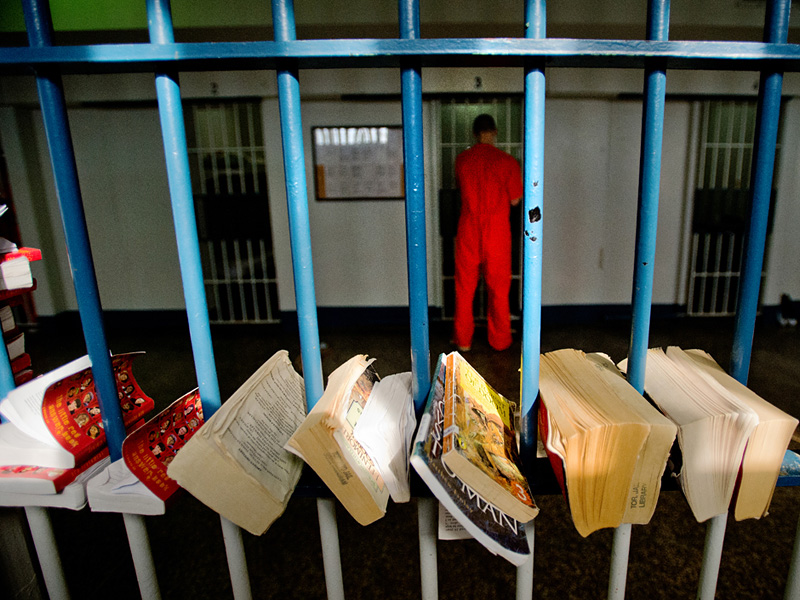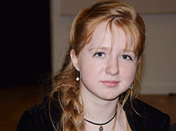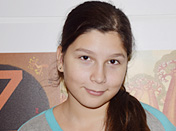
We like to think that reading, and reading fiction in particular, can have a transformative effect on behavior. In teachers’ circles we commonly hear that in teaching to read, encouraging reading, and, on occasion, even making children read, we make children “better.”
It turns out, that perspective is a popular one, not just here, but in Brazil. There, proponents of reading went even further—they supposed that reading could have a positive influence even on criminals. A news story appeared online about four prisons in Brazil that would reduce sentences for prisoners that read books. Read a book and your sentence is four days shorter. As for the choice of reading material, that was left up to the prisoners themselves, who have a library with both fiction and popular science at their disposal.
Whether this program was successful is as yet unclear. But we decided to ask our teenage experts what they thought of the idea itself. Do they share the widespread belief in the power of books to change people for the better?

Anna Semerikova, 11, “Book Expert of the XXI Century” contest winner
I think it’s a great idea! I think books will remind these people that they aren’t outcasts who are kept locked up and punished, but that they are people too. Sometimes people commit crimes through sheer foolishness. I do think the books they read should be non-aggressive and not too heavy. Definitely not Dostoevsky! I’ve read his children’s stories.


Alexandra Dvoretskaya, 13, “Book Expert of the XXI Century” contest winner
I can’t argue with the idea that books give people priceless information, which largely has a positive effect on people’s actions. It could be that the intention of the people who proposed this program was to set prisoners on the right path, show them examples of honor, kindness, and justice. But for people who are in prison, these concepts are too lofty. If someone reaches adulthood without having learned that “stealing is bad, killing people is very bad,” and decides to commit a crime, then I’m afraid the cause is psychological problems and it’s not likely that the experience gathered from books will help him redeem himself. Of course, a convict can change for the better and start a new life, but hardly thanks to books.
There are people, though, that are pushed to crime by relationships in their family, or with their friends, or gang leaders on the streets. Maybe they have no idea that you can have an honest life, that you can work instead of steal, and that most people live a different life than they do, that there are kind and just people in the world. Reading would be good for prisoners like that—people that likely haven’t read a single book in their lives. They just might start a new life that they hadn’t even imagined.


Polina Zelenova, 16, “Book Expert of the XXI Century” contest winner
At first, I couldn’t believe the headline I was seeing. How? Shortening prison sentences for reading? A book is a prize in itself, and for me personally, every day without a book is like that very same prison sentence. Then I was annoyed. As a child raised by parents with a democratic approach to bringing up a child, I can’t accept that a person should be forced to do what’s good for them. I think people are different and each person should get there on their own. Then, having thought a bit, I changed my mind again. Nobody’s forcing these people to read—they choose to do so themselves. And reading (reading good books, of course) is a path towards redemption and moral growth.
Prison could be a truly correctional institution thanks to this initiative. If reading helps even one person to reevaluate their actions, to find true life values, it will have been a success.
There were some practical considerations that occurred to me. How will they adjust the sentence? Will they check if the book was read? But all that is secondary.
I discussed this story with my classmates in Literature class. They were also hopeful that reading could help someone on their path to freedom, but think it’s imperative to confirm which crimes will be subject to a shorter sentence. After all, you can’t compare murder, drug trafficking, child sexual abuse, or violence to stealing a car.


Evgeny Zherbin, 14, “Book Expert of the XXI Century” contest winner
I find this idea rather controversial. On the one hand, it’s great that people are being motivated to read. On the other, realizing the program would entail too many practical difficulties. How would you check that the prisoner actually read the book and didn’t just leaf through it? Would you give them tests? Should the length of the book be taken into account? But overall the idea is undoubtedly an interesting one, and it couldn’t do much harm—after all, to shorten your sentence by a year, you’d have to read 90 books.


Daria Ponomareva, 15, “Reader with a Capital ‘R’” award
My first reaction was one of surprise. We tend to distance ourselves from things that are scary or dangerous and teenagers rarely run into something like that in schools. But having read and considered the text, I arrived at two conclusions. The first: if I were in the position of these people, I would latch onto the opportunity to get out of prison earlier, even if I hated books with all my heart. For those who love literature, even more so! You’ve committed a crime, now you can sit there reading a nice little book, enjoying yourself. If they let you out too soon—get back in there, rinse, repeat!
Literature you’ve read changes you, makes you better and more sympathetic, but if these people were murderers and rapists, no book can save them.
From there, the second conclusion: criminals can pick up some useful information in the books they read, information about prison breaks and famous heists, and by reading detective novels, for example, they could get more shrewd and slippery. Books are like a weapon and in the wrong hands they could be even more dangerous. If I’m ever in Brazil, I’ll be extra careful walking the streets.


Varvara Petrova, 13, “Reader with a capital ‘R’ Award”
My first impression of this initiative was: this is awesome!
There is one “but,” however: those who introduced this innovative idea were probably hoping people would be rehabilitated through books. (Or...what? That they would get in the habit of reading? Reinforce that habit?) But that transformation is unlikely to happen. Even so, the skill, the passion for reading could stay with someone—that, I think, is important. I just hope they won’t be disappointed in this project and cancel it!


Bogdan Ivanov, 15, “Book Expert of the XXI Century” contest winner
I think this is a rather interesting and right-minded initiative. Books certainly won’t hurt those who are in prison, and the chance to get out earlier should stimulate them to read.
To be fair, I think reading will hardly change ideological or professional criminals. If a drug-dealer reads War and Peace, he doesn’t cease to be a criminal. When he gets out, he’ll likely continue with his criminal business. That’s why reduced sentences through reading should only be available to people who are doing time for minor, or maybe medium, offenses. It could be that these four federal prisons house only prisoners who fall in those categories. If that’s the case, this new state of affairs could be quite beneficial.


Maria Mikheeva, 11, “Book Expert of the XXI Century” contest winner
My first impression was one of surprise. For some reason, I used to think that in prison everyone just sits, lies down, or walks around—basically, only the most primitive actions. It turns out they’re allowed to read! And that makes sense. For example, someone gets sentenced to five years—what’s he to do? Read, of course! It’s good for the mind and overall development, plus it shortens your sentence. I think this is a very good proposition, because it’s in reading that a person learns goodness, love, the beauty of nature and so on, and they learn to tell good from bad. In prison that’s especially important because they likely committed some bad deeds and maybe it was simply because they didn’t have the right moral guideposts in life, examples to follow. You’ll find more than enough of that in books.
But I do think that choosing books themselves is not quite it. It’s better when someone keeps an eye on what you’re reading—someone to make sure there aren’t meaningless magazines, to recommend classics or interesting stories, since they are better than any tabloids about pop stars. And most important of all would be to give them books with beautiful illustrations, because illustrations, too, can teach and help one develop taste.
Overall it’s a neat idea!


Anna Klykova, 13, “Book Expert of the XXI Century” contest winner
My first reaction was: what a strange proposition! There’s no logical link between a crime that’s been committed, and reading. I don’t think that people who have committed serious crimes have never read books. I’ve heard that prisoners read anyway. At least, those in Russian prisons do. And not just to reduce their sentences, either. Maybe those who proposed this are hoping that books will have a rehabilitory effect, but that idea doesn’t sit well with me.
After several days, my position remained the same. I don’t know how to make people stop being criminals. Even people who read a lot commit theft, robbery, and murder. I believe recommending books—not for reading in itself but to reduce prison sentences—is a very bad idea. It distorts the relationship between the person and the book. I’m all for good books in prison libraries, but I’m against making books into a tool for manipulation, whether by the prison administrators, or by the prisoners themselves.


Ksenia Barysheva, 13, “Book expert of the XXI Century” contest winner
The film The Shawshank Redemption came to mind right away. In it, the main character, who is serving a life sentence, creates a prison library. For some of the prisoners, it becomes vital, gives them hope for a different life. Then I remembered Mikhail Veller’s Major Zvyagin, where a list of books meant to build willpower turns one of the characters into a monster. That’s why I don’t think reading could be called a universal means for education or reeducation.
It’s important to also take into account the structure of crime and the intention of criminal punishment. After all, criminals are different from each other too and their punishment is meant to serve various functions outside of reeducation, including judgment for what’s been done and prevention of other crimes. It’s not only uneducated people or those who don’t like to read that commit crimes. Take Professor Moriarty, whom we could hardly accuse of being under-educated. In terms of being well-read, many of those guilty of bribery, misuse of office, forgery, and similar crimes would surpass any of their judges. It’s unlikely reading will in any way change their relationship to their crimes or change their views on the meaning of life and its purpose. All bank scammers have a higher education.
There are those who committed crimes due to negligence, such as traffic violations that led to people’s deaths. What’s the use of having them read a book only to reduce their sentence?
In my mother’s practice there were murderers who wrote poems and even published them in local newspapers....
This week I had the chance to ask acting judges what they thought of the matter. Their opinions were mixed. They said it was a way for the prison administration to reduce day-to-day violations while prisoners served time, and had nothing to do with reeducation.
But I do think it’s important. Books can change the world—otherwise there’d be no point in art or literature. A book can both inspire and comfort. If such reading helps even one person find meaning in life, it will be a good thing.
The judges told me another funny story about reading. “Anderson,” a children’s cafe in Yaroslavl had a sign that said “Kids left unattended will be eaten or sold as slaves.” The ombudsman for children’s rights complained to the regional Prosecutor’s Office. They in turn opened a case against an administrative violation for promoting cannibalism and human trafficking. The judges laughed long and hard and remembered all the classic stories, from “Little Red Riding Hood” and [Korney Chukovskiy’s] “Barmaley” to stories by the Brothers Grimm.


Romi Veide, 18, “Book expert of the XXI Century” contest winner
In our society being a prisoner is a stigma. When we imagine prison, we see a dark and scary place that’s just rife with criminals. Only some will go further and ask themselves: what if those very same prisoners are people like us, and what if they can change? What if someone took a wrong step just once and is now paying the price? Prison, after all, is not just a place where people wait out their sentence. The time spent behind bars can teach prisoners something important, and make some people start life anew.
I found the idea of reducing prison sentences through reading absolutely wonderful. Books cleanse the soul, they help us to escape reality when we most need to or, on the contrary, to examine ourselves and those around us with a sober, realist eye. Furthermore, books educate. They can give a desperate person hope, show another world, tell of how other people live and how different our lives can be. It’s reading that forces us to consider what we really want to achieve and how we want to be. That’s why I think that the more people in our world come to love books, the less cruelty, darkness, and crime there’ll be.
Note from the editor: Now, several months after this article's original publication, we know that the terms of the program allow convicts to choose books from a certain list, which does not contain books with overly violent content. After reading a book, the participant must write an essay. The program will count up to 12 books a year toward a reduced sentence, for a possible total of 48 days off the sentence.
Translated from the Russian by Alisa Cherkasova
Follow us on Facebook.
